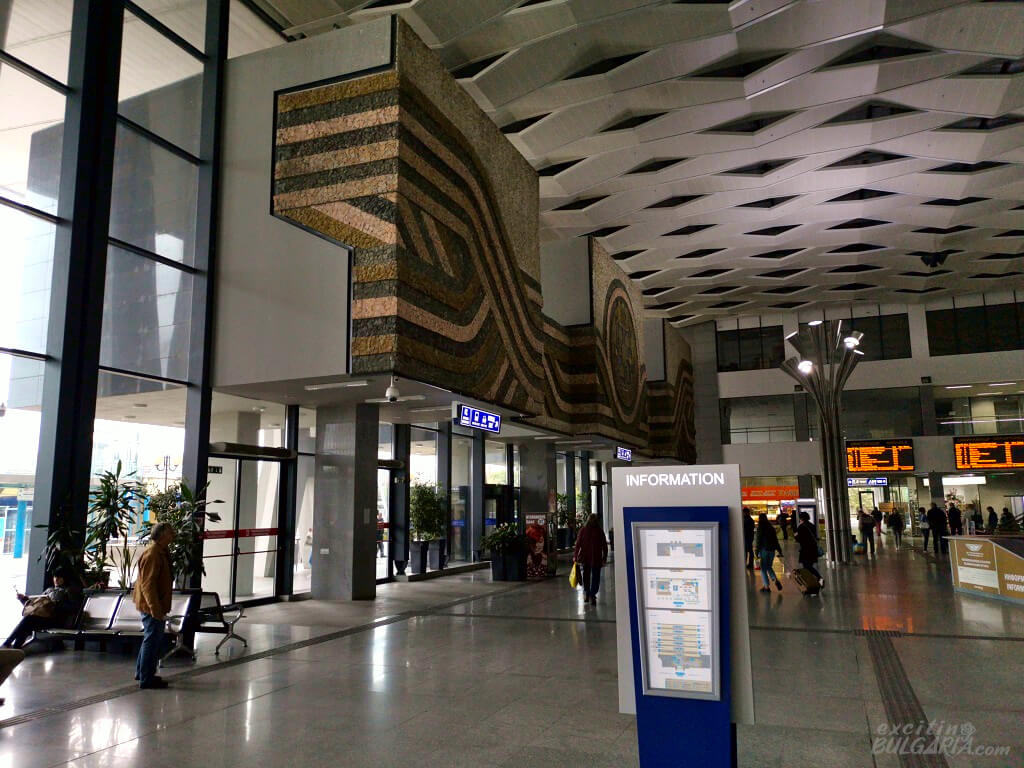Last updated on 8 January 2025
Train travel in Bulgaria is much less preferred among locals than buses. Trains are up to two times (!) slower, less modern and less cleaner in general. We also recommend choosing bus journeys over trains for traveling within the country. But in case of a long-distance trip, for example from Sofia to Varna, an overnight train with sleeping cabins can be a better choice.

The rail network
Bulgaria’s 4000 km railway network is operated by the Bulgarian State Railways (BG: Български държавни железници, Balgarski darzhavni zheleznitsi, abbreviations: БДЖ/BDZ/BDŽ).
The condition of trains is generally much worse than in Western Europe. As in many Eastern European countries, Bulgaria’s passenger railway network is completely state-owned. The network and facilities are degrading while improvements are slowly implemented since the end of the socialist era. The trains and stations are often dirty and in a poor condition, giving a real post-socialist feel. Of course there are modern, multiple unit passenger trains in operation as well.
All major cities have railway connection, smaller towns and villages are often connected to the main lines through non-electrified branch lines. There are no lines along the Black Sea coast, not even Burgas and Varna are directly connected. Given that, Sunny Beach has no railway connection either.
The real advantage of trains in Bulgaria is international travel through Greece, Turkey, Serbia or Romania, connecting the country with the rest of Europe.
Safety is not bad in general, but always keep an eye on your belongings. Occasional pickpocketing can occur any time.
Tickets and prices
Tickets can be bought at the local stations or online on BDZ’s website here. You need to register first in order to see times and prices. The online ticketing system is quite messy, and often doesn’t show all available trains. We don’t recommend pre-purchasing your ticket online as there is no need to do so in most cases.
TIP: Showing up at the local station around 45 minutes before the departure should be enough. You’ll have sufficient time to buy a ticket and catch the train. However, in peak summer periods, trains to Burgas and Varna can sell out quickly. Pre-purchasing the day before, especially for sleeper cabins, is advised in the summer.
The most popular destinations from Sofia with details and 2025 prices:
| Destination | Frequency | Duration (hours) | Price (BGN) |
|---|---|---|---|
| Plovdiv | Hourly | 2:30 | 11-14 |
| Varna | 8x a day | 7:45 | 24-30 |
| Burgas | 7x a day | 6:45 | 25-31 |
First class tickets are only about 25 percent more expensive than second class, offering more space and a more comfortable journey overall.
Traveling between major cities is highly recommended using “Fast” (BG: Бърз, Barz) category trains. These are faster and have less stops along the route. There are no “Express” category trains any more. They have been replaced by “Fast” trains that require a pre-allocated seat to be booked in advance. You’ll be advised at the counter (or online) if you need to do so.
Trains departing late and running overnight to distant cities offer sleeper coaches as well. Business class sleeper cabins are for a single person. These are the most expensive tickets, but ideal if you are traveling alone, and don’t want company. First class sleeper cabins have two beds, second class ones have three. The prices are 20-65% higher than normal first class seats for the same train. By the way, normal seats on late night trains are cheaper than the usual prices.

Discounts
Buying return tickets is usually 10% cheaper compared to separate one-way prices on all routes, train categories and classes.
For small groups between 3 and 6 passengers, there is a 15 % discount from regular fares for one-way journeys. You need to ask for the discount when buying your tickets.
Children up to 7 years travel for free. There is no need to book a ticket for them unless the train requires an allocated seat to be bought.
Passes
For those who want to spend the majority of their time on the trains themselves, there are different kinds of passes to choose from.
Eurail/Interrail passes are available from 59 EUR (NOT BGN) which can be used on 3 days of your choice during a set period of 1 month. On these days you can ride on as many trains as you like between midnight and midnight. The options available are 3, 4, 5, 6 or 8 days to travel within 1 month.
There is another, similar ticket type called Balkan Flexipass. This is a train pass for trips on the territory of Bulgaria, Bosnia and Herzegovina, Greece, Montenegro, North Macedonia, Romania (only for trains operated by REGIOTRANS), Serbia and Turkey. Passengers can choose from passes for 3, 5, 7, 10 or 15 randomly selected days within 2 months. Prices start from 91 EUR (NOT BGN) for the 3-day pass.
Travel tip
There is a scenic, narrow gauge route between Septemvri and Dobrinishte. It passes through Avramovo, the highest railway station in the Balkans (1267 m), and reaches Bansko, the tourist capital and most important ski resort of the Pirin Mountains. The line is not electrified, so it’s usually served by diesel trains. However, you can find steam locomotives as well providing attraction tours. The 110 km long trip from Septemvri to Bansko takes 5 hours.